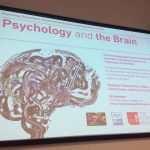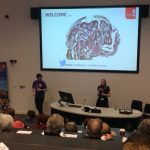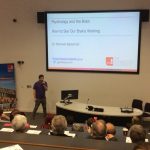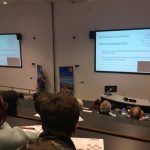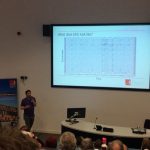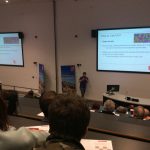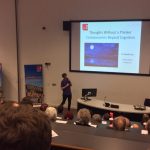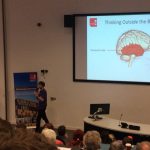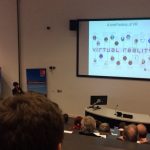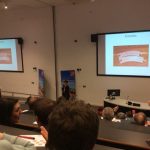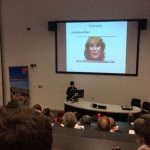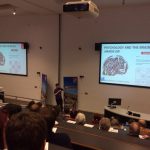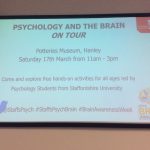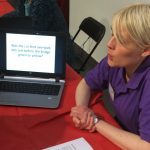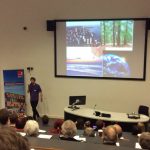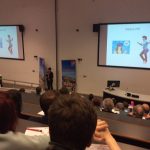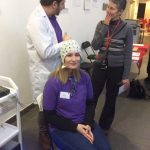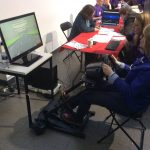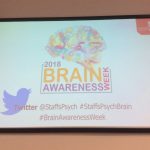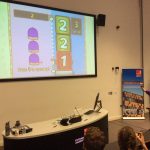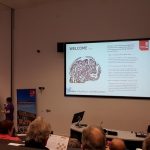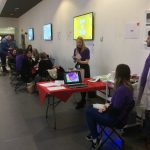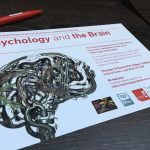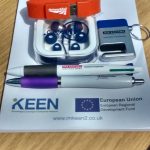Darel Cookson (Psychology PhD student, Staffordshire Centre for Psychological Research) blogs about the recent inaugural Keele-Staffs Psychology Postgraduate Conference, with postscript from Dr. Richard Jolley (PhD Psychology course leader)
On the 25th April, 2018 the first Joint Keele and Staffordshire University Psychology Postgraduate Conference was held at Keele University. Although Keele have been running the conference for a number of years, this was the first time the event was organised and ran in collaboration with Staffordshire University. Consequently the event was an ideal opportunity for postgraduate researchers at the neighbouring institutions to share their research and build networks.
The conference was directed by Professor Claire Fox (Postgraduate Research Co-ordinator in Psychology at Keele University) and Dr Richard Jolley (Senior Lecturer in Psychology and PhD course leader at Staffordshire University). The organisation was led by the student committee which consisted of myself from Staffordshire University and Emma Harrison and Charlotte Bagnall, second and first year Keele Psychology PhD students, respectively. Collaborating with fellow PhD students from Keele was an immensely enjoyable and rewarding experience.
The morning began with an introduction and welcome from Professor Claire Fox, before the postgraduate speakers commenced. The first presenter was Keele PhD researcher, Olly Robertson, who gave a dynamic and informative overview of her current study. Olly is investigating whether perceived deficits in emotional regulation are associated with heart rate variance; who knew that the time between heart beats was so important? I gave the second presentation discussing the antecedents and consequences of belief in conspiracy theories, while revealing the rationale for my initial PhD investigations. This was followed by a thought-provoking account of the implementation of an innovative domestic abuse prevention programme by Keele MSc student Jess McElwee. Her research assessed student responses to a ‘Love Hurts’ play, aimed at addressing teenage relationship abuse and found that students felt theatre was an effective means of delivery, while further exploration into issues of trust and gender were suggested. The final presentation of the morning session was by Keele PhD student Angela Blanchard. Angela is conducting an autoethnography of childhood emotional neglect, and provided a compelling description of her data collection process and the resultant model she is developing. The model comprises ten themes evolved from thematic analysis.
Lunch was accompanied by poster presentations and of course we had time for a group photo too.
There was a wide-variety of psychology sub-disciplines represented by the posters:
- Recollection and familiarity- Memory for pictures and words. Jamie Adams (Keele).
- The effects of early and late sleep on false memory. Zainab Alyobi (Keele).
- Student Bullying in Higher Education: The Story So Far. Emma Harrison (Keele).
- How do we attribute blame and responsibility for alcohol addiction? Claire Melia (Keele).
- Utilizing eye-tracking to investigate the role of attention in emotional false memory formation. Emma Roberts (Staffordshire).
The afternoon session began with an introduction and welcome by Dr Richard Jolley, proceeded by the first afternoon speaker. Angela Bonner, a PhD student from Staffordshire University, gave an engaging and informative review of her current research. Angela is investigating the impact of glucoregulatory control on emotional recognition memory, when blood glucose is elevated. The second speaker of the afternoon was Kara Holloway, a PhD researcher from Keele. Kara shared her research; implementing a video-based student alcohol intervention, delivered through an app. The intervention included personalised feedback on the harms of drinking and social norming information and preliminary findings were shared. Charlotte Bagnall then discussed how her BSc and MSc research has informed her current PhD study: Improving children’s emotional well-being over primary-secondary school transition. Charlotte has conducted case study research and focus groups to inform her targeted emotional-resilience support intervention aimed at improving children’s experiences of this transition.
After a caffeine re-fuel, the afternoon session continued with Amelia Rout, a part-time PhD student from Staffordshire University, presenting her current research exploring the success of non-traditional students in higher education. Amelia’s research uses mixed methods to examine the influence of self-esteem and self-efficacy on academic success and preliminary findings show that issues around self-confidence and study skills of non-traditional students are often interlocking. The final presenter of the day was Daniella Hult-Khazaie, a PhD researcher from Keele University who provided an in-depth and engaging overview of her PhD area and planned studies. Daniella is investigating the effect of a shared social identity on health risk perceptions in mass gathering; does the sense of a shared social identity influence people’s perceptions of susceptibility to health risks at mass gathering?
As is illustrated above, there was great research shared from a wide-variety of sub-disciplines in Psychology. The day closed with an honest, informative and engaging Keynote from Dr Sarah Rose. Dr Sarah Rose is a Psychology Lecturer and Course leader for the BSc Psychology and Child Development degree at Staffordshire University and gave an overview of her career pathway which has led her from Staffordshire, to Keele and back! For all the PhD students listening, Sarah’s talk was invaluable and inspiring; thank you for sharing Sarah!
Thank you to all who attended the first Joint Keele and Staffordshire University Psychology Postgraduate Conference and for making it a success. And a huge congratulations to Kara Holloway and Claire Melia, who won best presentation and best poster respectively!
As course leader of the Psychology PhD students at Staffordshire University I was delighted to be offered the opportunity by our Keele colleagues to develop the first joint postgraduate conference between our two universities. Professor Claire Fox commented that this year’s event was the best ever, and we will certainly be working together to continue and develop this conference on a yearly basis. Next year it may well be held at Staffordshire University, watch this space!
This year’s inaugural conference was very professionally organised by the committee of PhD students.The schedule of talks was perfectly organised, with a very good balance of topics and talks from both departments, with well-placed breaks. Professional event organisers could not have done a better job!
If you are interested in studying for a PhD in the Department of Psychology we have nearly 50 academic members of staff, with expertise covering the full range of subdisciplines in psychology: biological, cognitive, developmental, individual differences, and social. In addition, we have expertise in clinical, counselling and health psychology, running professional programmes in all of these subjects. A range of quantitative and qualitative methodologies is employed throughout the department.
Please contact me at r.jolley@staffs.ac.uk for all PhD enquiries.
Dr. Richard Jolley
The Department of Psychology at Staffordshire University offers a range of undergraduate and postgraduate degrees in Psychology at the University’s £30 million Science Centre in Stoke-on-Trent.
Interested in a Psychology degree? Come to an Open Day – for further details and to book your place at an open day please click here.
For more information about the Psychology degrees on offer at Staffordshire University please visit the below pages:











